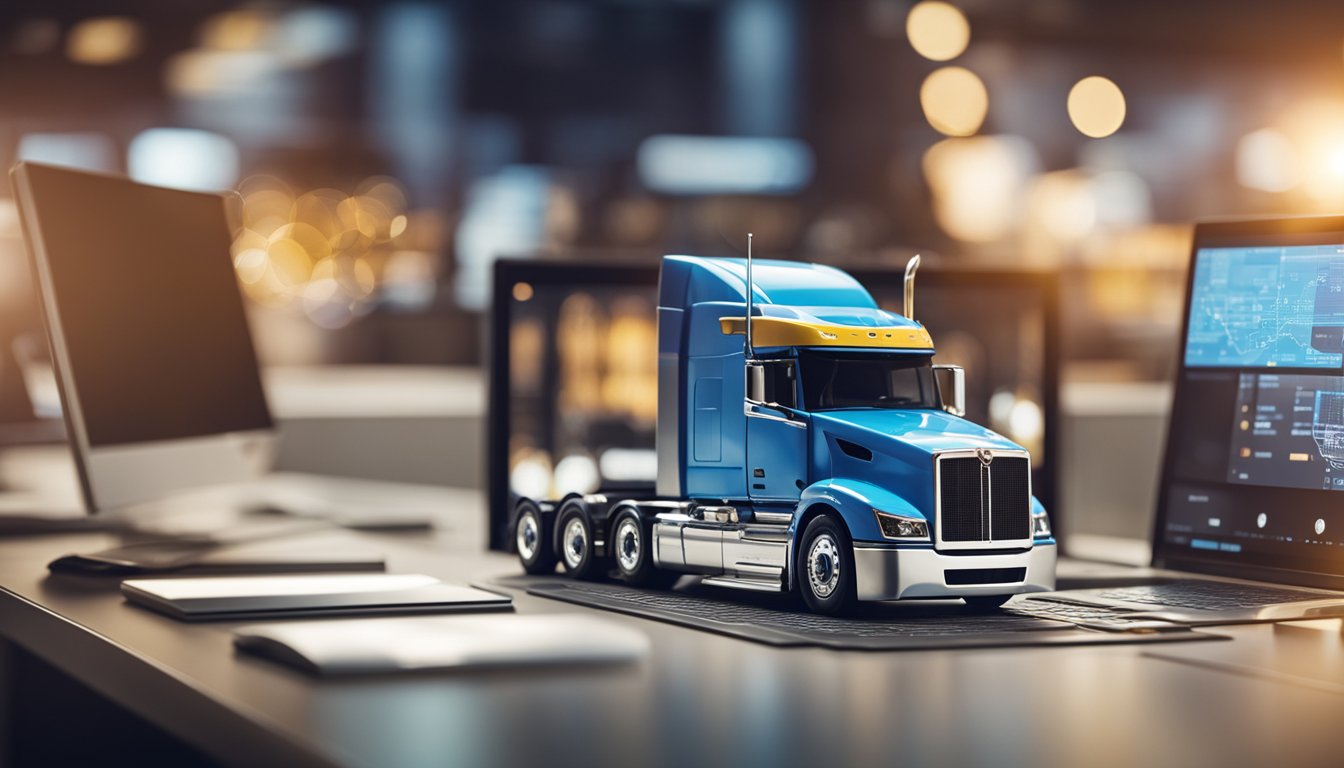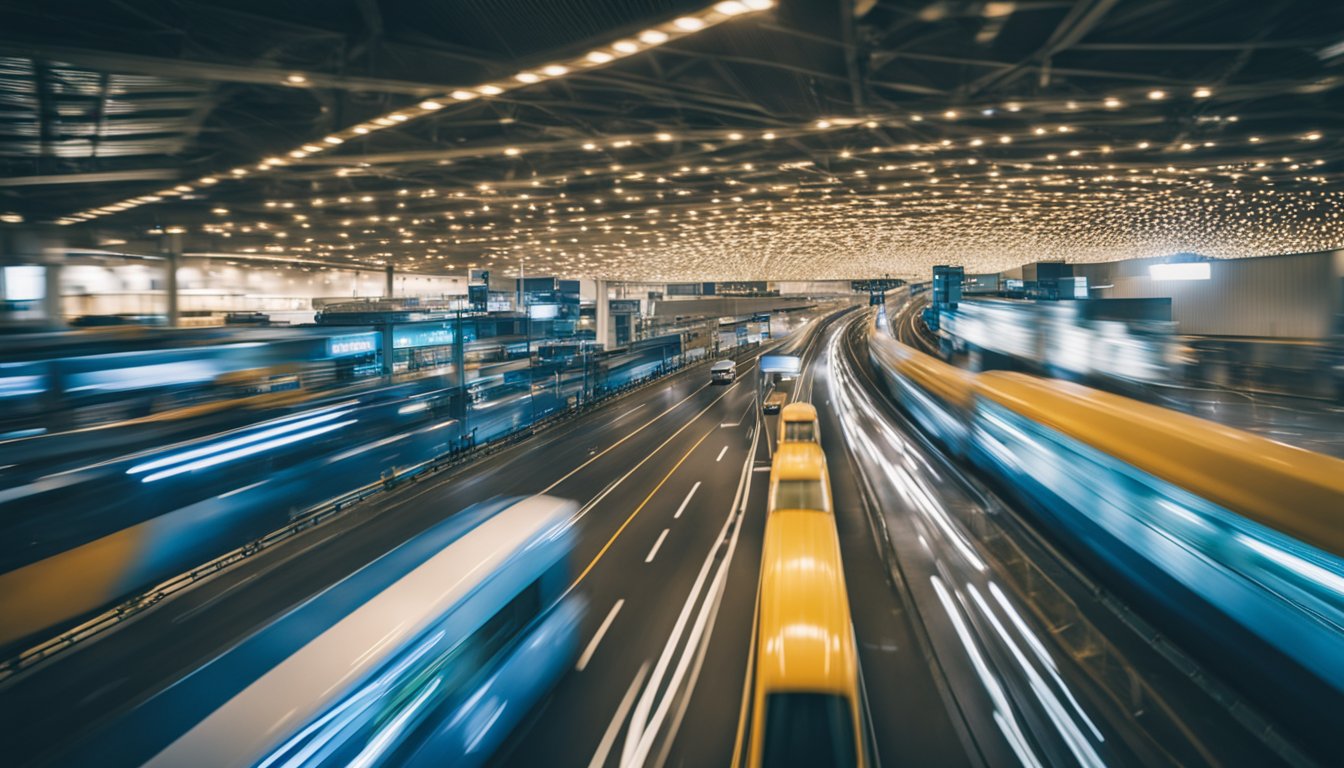Digital Transformation Transportation and Logistics Solutions
Transportation and logistics are critical components of the global economy, and digital transformation is rapidly changing the way these industries operate. The use of digital technologies, such as the Internet of Things (IoT), artificial intelligence (AI), and blockchain, is enhancing operational efficiency, reducing costs, and improving customer experiences. As a result, transportation and logistics companies are increasingly investing in digital transformation initiatives to remain competitive in the market.

Digital transformation in transportation and logistics involves the integration of advanced technologies to streamline operations, increase visibility, and optimize supply chains. For example, IoT sensors can be used to track shipments in real-time, providing companies with greater visibility into their supply chains. AI-powered predictive analytics can help logistics companies optimize routes, reducing delivery times and costs. Blockchain technology can be used to enhance supply chain transparency and security, reducing the risk of fraud and errors.
Enhancing customer experience through digital technologies is another key benefit of digital transformation in transportation and logistics. By leveraging digital technologies, companies can provide customers with real-time updates on their shipments, improve delivery times, and offer personalized services. This can lead to increased customer satisfaction and loyalty, which can ultimately drive business growth.
Key Takeaways
- Digital transformation is rapidly changing the transportation and logistics industry, with companies investing in advanced technologies to streamline operations and optimize supply chains.
- The use of digital technologies such as IoT, AI, and blockchain is enhancing operational efficiency, reducing costs, and improving customer experiences.
- By leveraging digital technologies, transportation and logistics companies can provide customers with real-time updates, improve delivery times, and offer personalized services, leading to increased customer satisfaction and loyalty.
Digital Transformation in Transportation and Logistics

In recent years, the transportation and logistics industry has undergone a significant digital transformation. New technologies such as AI, machine learning, IoT, GPS, and blockchain have revolutionized the way things are done in this industry. In this section, I will discuss some of the key areas where digital transformation has made an impact.
Role of AI and Machine Learning
AI and machine learning have become increasingly important in the transportation and logistics industry. These technologies can help automate many processes, such as route optimization, freight matching, and predictive maintenance. By using AI and machine learning algorithms, companies can make better decisions based on data analysis and improve efficiency.
For example, AI-powered predictive maintenance can help companies identify potential issues with vehicles or equipment before they become major problems. This can help reduce downtime and improve safety. Additionally, AI can help optimize routes by analyzing traffic patterns and other data to identify the most efficient route for a particular shipment.
The Impact of IoT and GPS
IoT and GPS technologies have also made a significant impact on the transportation and logistics industry. IoT devices can be used to track shipments, monitor temperature and humidity levels, and provide real-time data on the status of a shipment. GPS technology can also be used to track vehicles and optimize routes.
By using IoT and GPS technologies, companies can improve supply chain visibility, reduce the risk of lost or stolen shipments, and optimize delivery times. For example, GPS tracking can be used to monitor the location of a shipment in real-time, allowing companies to provide accurate delivery estimates to customers.
Blockchain Technology in Logistics
Blockchain technology is another area where digital transformation is making an impact in the transportation and logistics industry. Blockchain can be used to create a secure, transparent, and decentralized system for tracking shipments and managing transactions.
By using blockchain technology, companies can reduce the risk of fraud and errors in transactions, improve supply chain transparency, and provide customers with real-time updates on the status of their shipments. Additionally, blockchain can help automate many processes, such as customs clearance and payment processing.
In conclusion, digital transformation has had a significant impact on the transportation and logistics industry. By using technologies such as AI, machine learning, IoT, GPS, and blockchain, companies can improve efficiency, reduce costs, and provide better service to their customers.
Enhancing Customer Experience Through Digital Technologies

As a transportation and logistics solution provider, I recognize the importance of enhancing customer experience through digital technologies. In today's fast-paced world, customers expect seamless and hassle-free transportation and logistics services. By leveraging data and analytics, and improving visibility and transparency, we can provide customers with a more engaging and satisfying experience.
Leveraging Data and Analytics
One of the most significant benefits of digital transformation in transportation and logistics is the ability to collect and analyze data. By leveraging data and analytics, we can gain valuable insights into customer behavior, preferences, and needs. This information can be used to optimize our services and provide customers with a more personalized experience.
For instance, we can use data analytics to predict customer demand and optimize our delivery routes. This will help us reduce delivery times, minimize costs, and improve overall efficiency. By using data analytics, we can also identify areas where we can improve our services and enhance customer satisfaction.
Improving Visibility and Transparency
Another critical aspect of enhancing customer experience is improving visibility and transparency. Customers want to know where their shipments are, how long they will take to arrive, and what the status of their delivery is. By providing real-time tracking information and updates, we can keep customers informed and engaged throughout the entire delivery process.
Digital technologies such as GPS tracking, RFID tags, and barcodes can help us improve visibility and transparency. By using these technologies, we can track shipments in real-time, provide accurate delivery estimates, and notify customers of any delays or issues. This will help us build trust with customers and enhance their overall experience.
In conclusion, digital transformation in transportation and logistics provides us with a unique opportunity to enhance customer experience through data analytics, visibility, and transparency. By leveraging these technologies, we can provide customers with a more engaging and satisfying experience, improve efficiency, and build trust.
Operational Efficiency and Cost Reduction

As a transportation and logistics company, I understand the importance of operational efficiency and cost reduction. Digital transformation can help companies achieve these goals by leveraging technologies such as automation, process optimization, and legacy systems integration.
Automation and Process Optimization
One of the main benefits of digital transformation is automation, which can significantly increase operational efficiency. Automation can help reduce human error, minimize manual labor, and improve overall productivity. For example, transportation companies can use automation to streamline their supply chain processes, such as order processing, shipment tracking, and delivery management.
Digital transformation also enables process optimization, which involves analyzing and improving existing processes to make them more efficient. By optimizing processes, companies can reduce costs and improve customer satisfaction. For example, transportation companies can use data analytics to identify bottlenecks in their supply chain and optimize the flow of goods.
Legacy Systems and Integration Challenges
However, digital transformation is not without its challenges. Legacy systems and integration issues can hinder the adoption of new technologies and limit their effectiveness. Many transportation companies still rely on outdated systems that are not compatible with modern technologies.
To overcome these challenges, companies must invest in legacy system modernization and integration. This involves upgrading existing systems or replacing them with new ones that are compatible with digital technologies. By doing so, companies can improve their operational efficiency and reduce costs in the long run.
In conclusion, digital transformation can help transportation and logistics companies achieve operational efficiency and cost reduction. By leveraging automation, process optimization, and legacy systems integration, companies can streamline their supply chain processes, reduce costs, and improve customer satisfaction. However, it is important to address legacy system and integration challenges to fully realize the benefits of digital transformation.
The Future of Digital Transformation in Transportation and Logistics

As someone who has been closely following the developments in the transportation and logistics industry, I can confidently say that the future of digital transformation in this field is very promising. With the adoption of new technologies at an ever-increasing rate, the industry is poised to become even more efficient, agile, and customer-centric.
One of the most significant benefits of digital transformation in transportation and logistics is the increased innovation it brings. By leveraging the latest technologies such as artificial intelligence, machine learning, and the Internet of Things (IoT), companies can optimize their operations and improve their decision-making capabilities. This, in turn, leads to better customer experiences and increased revenue.
Another critical factor that digital transformation enables is agility. In today's fast-paced business environment, companies need to be able to quickly adapt to changing market conditions. By digitizing their operations, transportation and logistics companies can respond more quickly to market demands, optimize their supply chains, and reduce costs.
Sustainability is another area where digital transformation is having a significant impact. By using data analytics and other technologies, transportation and logistics companies can reduce their carbon footprint, optimize their routes, and minimize waste. This not only benefits the environment but also helps companies save money on fuel and other resources.
Industry 4.0 is another buzzword that is closely associated with digital transformation in transportation and logistics. This term refers to the fourth industrial revolution, which is characterized by the integration of digital technologies into all aspects of business operations. By embracing Industry 4.0, transportation and logistics companies can gain a competitive edge by improving their efficiency, reducing costs, and delivering better customer experiences.
Finally, it's worth noting that digital transformation is also disruptive. Companies that fail to embrace digital technologies risk being left behind by their competitors. On the other hand, those that do embrace digital transformation can experience significant growth and success.
In conclusion, the future of digital transformation in transportation and logistics is very bright. By embracing the latest technologies and leveraging data analytics, companies can become more efficient, agile, and sustainable. As someone who is passionate about this field, I'm excited to see what the future holds.
Frequently Asked Questions

How are digital technologies transforming the logistics industry?
Digital technologies are transforming the logistics industry by enabling companies to optimize their supply chain operations and improve their overall efficiency. With the help of technologies such as the Internet of Things (IoT), artificial intelligence (AI), and blockchain, logistics companies can now track and monitor their shipments in real-time, automate their processes, and reduce costs. For example, IoT sensors can be used to monitor the location, temperature, and humidity of goods during transportation, while AI algorithms can help optimize delivery routes and predict demand.
What are the key findings of S&P Global Market Intelligence's supply chain digital transformation Enterprise Survey 2023?
According to S&P Global Market Intelligence's supply chain digital transformation Enterprise Survey 2023, the majority of logistics and transportation companies are investing in digital transformation initiatives. The survey found that 75% of respondents plan to invest in new technology solutions over the next three years, with the top priorities being automation, AI, and IoT. Additionally, the survey found that companies are increasingly looking to partner with technology providers and startups to accelerate their digital transformation efforts.
What is the impact of digital transformation on the automotive industry's transportation and logistics solutions?
Digital transformation is having a significant impact on the automotive industry's transportation and logistics solutions. With the rise of electric and autonomous vehicles, logistics companies are facing new challenges in terms of managing the supply chain for these vehicles. However, digital technologies such as AI, IoT, and blockchain are helping to address these challenges by enabling companies to track and monitor their vehicles in real-time, optimize their routes, and reduce costs. Additionally, digital technologies are enabling companies to improve their customer experience by providing real-time visibility into the status of their shipments.
How can logistics and transportation companies leverage digitalization and technology to improve their operations?
Logistics and transportation companies can leverage digitalization and technology to improve their operations in several ways. First, they can use IoT sensors to track and monitor their shipments in real-time, which can help them optimize their routes and reduce costs. Second, they can use AI algorithms to predict demand and optimize their inventory levels. Third, they can use blockchain to improve transparency and security in their supply chain operations. Finally, they can leverage cloud computing and big data analytics to gain insights into their operations and make data-driven decisions.
What are some examples of successful digital transformation in the logistics industry?
There are several examples of successful digital transformation in the logistics industry. For example, UPS has implemented a range of digital technologies, including IoT sensors, AI algorithms, and blockchain, to optimize its supply chain operations. As a result, the company has been able to reduce costs, improve efficiency, and provide better customer service. Another example is Maersk, which has implemented a blockchain-based platform to improve transparency and security in its supply chain operations.
What are the potential benefits and drawbacks of digital transformation for the transportation industry?
The potential benefits of digital transformation for the transportation industry include improved efficiency, reduced costs, and improved customer service. However, there are also potential drawbacks, such as the risk of cyber attacks, the need for significant investment in new technology solutions, and the potential for job losses due to automation. It is important for transportation companies to carefully consider these factors when implementing digital transformation initiatives.

We are committed to delivering a new level of automation that will help organizations save time, money, and staffing resources.
 WRITE FOR US!
WRITE FOR US!
